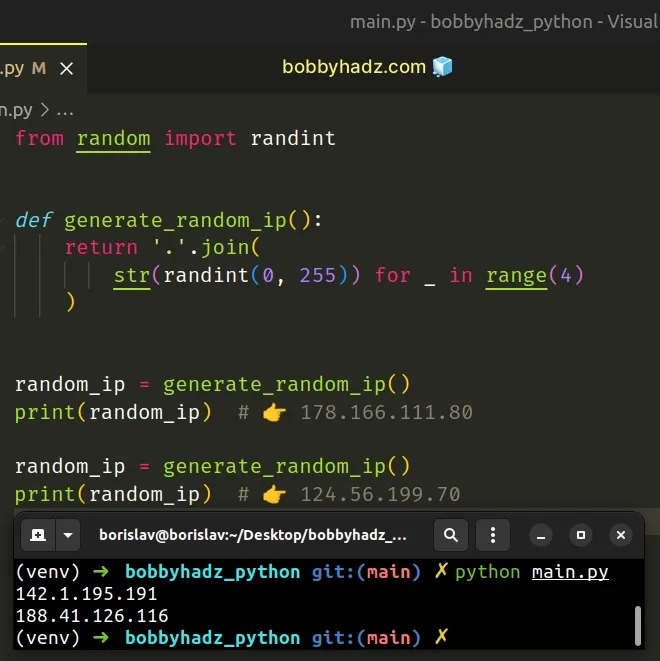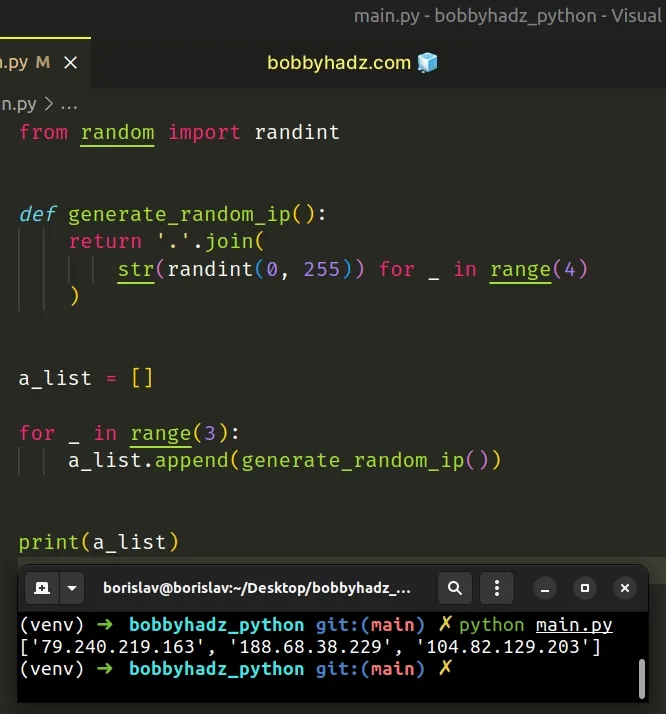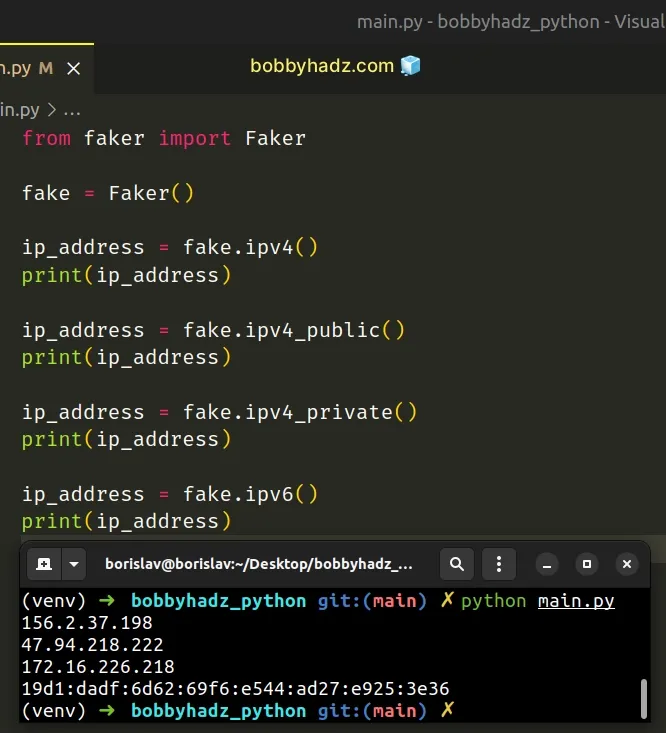How to generate a random IP address in Python
Last updated: Apr 10, 2024
Reading time·3 min

# Table of Contents
# Generate a random IP address in Python
To generate a random IP address:
- Use the
random.randint()method to generate a random number from0to255. - Generate a random number in the range
4times. - Use the
str.join()method to join the numbers with a period separator.
from random import randint def generate_random_ip(): return '.'.join( str(randint(0, 255)) for _ in range(4) ) random_ip = generate_random_ip() print(random_ip) # 👉️ 178.166.111.80 random_ip = generate_random_ip() print(random_ip) # 👉️ 124.56.199.70

We used a
generator expression
to iterate over a range object of length 4.
The range() class is commonly used for looping a specific number of times.
print(list(range(4))) # 👉️ [0, 1, 2, 3]
On each iteration, we use the random.randint() method to generate a random
number from 0 to 255.
from random import randint def generate_random_ip(): return '.'.join( str(randint(0, 255)) for _ in range(4) ) random_ip = generate_random_ip() print(random_ip) # 👉️ 178.166.111.80
The
random.randint()
function takes 2 numbers - a and b as parameters and returns a random
integer in the range.
Note that the range is inclusive - meaning both a and b can be returned.
str() class to convert each number to a string because the str.join() method can only be passed string values.The str.join method takes an iterable as an argument and returns a string which is the concatenation of the strings in the iterable.
Note that the method raises a TypeError if there are any non-string values in
the iterable.
The string the method is called on is used as the separator between the elements.
# Generating a list of N IP addresses
You can use the range() class to generate a list of N IP addresses.
from random import randint def generate_random_ip(): return '.'.join( str(randint(0, 255)) for _ in range(4) ) a_list = [] for _ in range(3): a_list.append(generate_random_ip()) # 👇️ ['123.31.155.255', '70.22.71.106', '183.142.245.87'] print(a_list)

We used the range class to call the function 3 times and appended the IP
addresses to a list.
Alternatively, you can use the Faker module.
# Generate a random IP address using Faker
This is a three-step process:
- Install the
Fakermodule by runningpip install Faker. - Use the
Fakerclass to create aFakerobject. - Use the
ipv4()method to generate a random IP address.
from faker import Faker fake = Faker() ip_address = fake.ipv4() print(ip_address) # 👉️ 173.188.6.176 ip_address = fake.ipv4_public() print(ip_address) # 👉️ 54.45.106.198 ip_address = fake.ipv4_private() print(ip_address) # 👉️ 10.103.230.160 ip_address = fake.ipv6() print(ip_address) # 👉️ 120b:ecc2:fe2f:1db1:d79c:99e1:a960:3221

Make sure to install the Faker module if you haven't.
pip install Faker # 👇️ or pip3 pip3 install Faker
# Generate random public or private IPv4 addresses
The faker.ipv4() method returns a random IPv4 address.
from faker import Faker fake = Faker() ip_address = fake.ipv4() print(ip_address) # 👉️ 173.188.6.176
The faker.ipv4_public() method returns a public IPv4 address excluding private
blocks.
from faker import Faker fake = Faker() ip_address = fake.ipv4_public() print(ip_address) # 👉️ 188.104.196.43
The faker.ipv4_private() returns a private IPv4 address.
from faker import Faker fake = Faker() ip_address = fake.ipv4_private() print(ip_address) # 👉️ 172.18.1.188
# Generate random IPv6 addresses
The faker.ipv6() method returns a random IPv6 address.
from faker import Faker fake = Faker() ip_address = fake.ipv6() print(ip_address) # 👉️ 2528:a863:c2ff:413f:b8de:28ff:3f92:5b7
# Additional Resources
You can learn more about the related topics by checking out the following tutorials:
- Generate N unique Random numbers within a Range in Python
- Generate a random alphanumeric String in Python
- Generate random Boolean (True or False) values in Python
- Generate random bytes of length N in Python
- How to generate random Words or Letters in Python
- How to find the dependencies of a Python package
- Check the syntax of a Python script without executing it
- Copy a column from one DataFrame to another in Pandas
- ImportError: DLL load failed: %1 is not a valid Win32 application
- OSError: [E050] Can't find model 'en_core_web_sm'
- ssl.SSLError: [SSL: WRONG_VERSION_NUMBER] wrong version number (_ssl.c:1002)
- You must either define the environment variable DJANGO_SETTINGS_MODULE or call settings.configure() before accessing settings
- Python: Not all parameters were used in the SQL statement
- How to restart a Python Script

